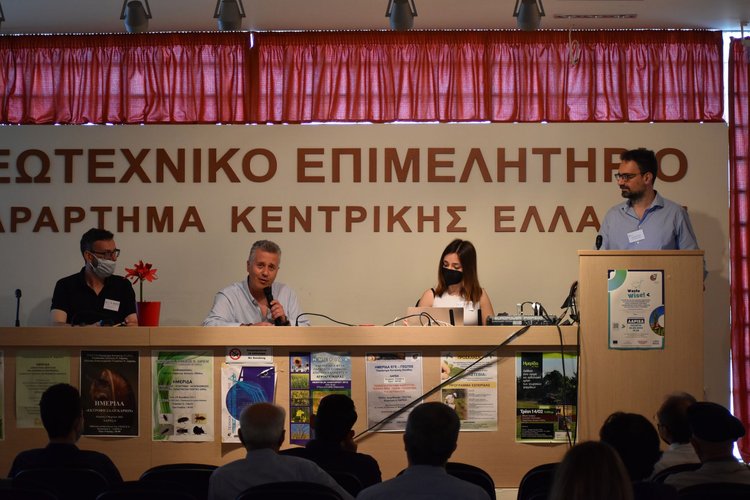The Pinios river basin constitutes the most productive agricultural basin in Greece, in which unsustainable water management, competing demand for resources between different sectors, and the climate crisis conditions, present increasing pressures to the entire WEFC Nexus system.
Watch the video of the 1st Pinios pilot Technical Workshop:
The 1st Technical Workshop of the REXUS Pinios pilot took place on 17th May, 2022, in Larissa city, Greece, and succeeded in bringing together over 30 stakeholders from 25 different institutions, representing government bodies, research institutions, farmers and other users, thus covering the full spectrum of levels of interest and influence in the pilot area.
The workshop followed an extensive process of LAA building, which included the mapping of relevant stakeholders, followed by in-depth individual interviews on the Nexus challenges of the area, resulting in the analysis of all the collected data, with the input of the relevant REXUS consortium partners. As the next step in the Pinios LAA development, the 1st technical workshop aimed to:
- Validate the synthesis of results from stakeholders’ viewpoints.
- Finalise the determination/ confirmation/prioritization of challenges, problems, obstacles, strengths, opportunities, and indicators.
- Collaboratively identify cross-sectoral dependencies.
- Assess institutional adaptation capacity to climate change.
- Initialise future visioning.

Dr. Andreas Panagopoulos, Research Director of Soil and Water Resources Institute of Hellenic Agricultural Organization “DEMETER”, opened the workshop and described the overarching challenge of bringing together scientific analysis and decision-making, which has eluded efforts in the Pinios basin for decades.
Addresses were then made by the representatives of Geotechnical Chamber of Greece, Hellenic Ministry of Environment & Energy, Hellenic Ministry of Rural Development & Food, and REXUS partners.
Dr. Vassilios Pisinaras, Associate Researcher of Soil and Water Resources Institute of Hellenic Agricultural Organization “DEMETER”, presented the progress and outcomes of the REXUS project so far, including data collection and initiated analysis; analysis of stakeholders’ input; presentation of challenges, problems and indicators; presentation of obstacles; and presentation of Causal Loop and Sankey diagrams.

Prof. Jose Gonzalez Piqueras, University of Castilla-La Mancha, coordinator of the REXUS project, presented the preliminary results on land suitability and water accounting, one of the key tools offered by REXUS for the Pinios pilot.
The meeting brought stakeholders from diverse backgrounds and with often differing opinions, to actively work together in groups in order to analyse in-depth the key challenges and needs for Pinios river basin. They mapped the obstacles, risks, strengths, opportunities and relevant indicators of each of the six main challenges identified through the stakeholders’ personal interviews process, contributing their particular insights and sectoral perspectives. Stakeholders also identified the interrelationships between drivers, challenges, needs and impacts between the Nexus components in the Pinios pilot, resulting in the development of a Causal Loop Diagram.

Participants were very vocal describing the great challenges that the basin are facing, which have been left unaddressed for decades, and are growing more acute under the climate crisis conditions and the projected unstable economic environment. They also expressed hope and confidence that the effort led by REXUS, backed by robust science and bringing all the required parties to the table, will succeed in providing the required insights and practical tools that can be translated into specific policies and actions to efficiently address the identified challenges.

